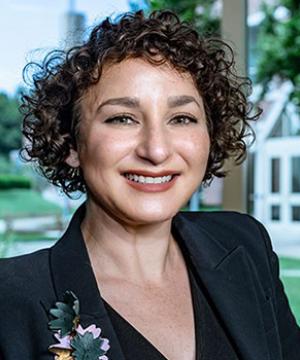Hiba Hafiz ’10 on the Careers in Law Teaching Program
Assistant Professor of Law, Boston College Law School
Columbia Law School’s Careers in Law Teaching Program (CILTP) has a long history of preparing students and alumni for jobs in academia. CILTP provides comprehensive guidance, including one-on-one mentorship, job-talk training, moot interviews, and preparation for the annual Association of American Law Schools Faculty Recruitment Conference in Washington. We talked with six alumni whose experiences with the program helped guide them toward faculty positions at law schools across the country.
Hiba Hafiz focuses on labor and employment law, antitrust law, and administrative law in her teaching and writing. She has a B.A. from Wellesley College and a Ph.D. in comparative literature from Yale University, where she was a union organizer. After receiving her J.D. from Columbia, she represented farmworkers who were victims of human trafficking as a David W. Leebron Human Rights Fellow at International Rights Advocates. She also clerked on the U.S. Court of Appeals for the 1st Circuit and on the U.S. District Court for the District of New Jersey. Prior to joining the faculty of Boston College Law School, she was a teaching fellow and lecturer in law at the University of Chicago Law School.
Why did you want to be an academic?
After my clerkships, I spent three years at a public interest law firm where I represented workers in antitrust class actions. But I kept finding myself wanting to delve into the historical, theoretical, and structural aspects of how labor markets work and could be better regulated, and I wanted to return to researching and writing full time.
How did the Careers in Law Teaching Program help you?
It facilitated mentorship and advice from key faculty members before and during my job market search. I deeply benefited from the opportunity to participate in the Moot Workshop, but most importantly, the faculty feedback on my job talk paper, performance giving the job talk, and how I handled the Q&A afterward was invaluable.
What advice do you have for students or lawyers in practice who want to pursue academic careers?
Write, write, write! In any and all ways: Student notes, essays on recent cases, blog posts, law review articles, op-eds, articles in mainstream and more-specialized newspapers.
What are the best aspects of being a professor?
Having the time to research and write, to discuss my ideas with other faculty at my home institution and at conferences, to read and share in other people’s great ideas inside and outside my field, and to make an impact on debates on work and antitrust policy has been exciting, challenging, and deeply enjoyable. But teaching has been transformational—it’s inspiring to be a part of giving students the opportunity to engage with the law and to feel empowered to shape it when they go on to practice.
# # #
Published on March 21, 2019
